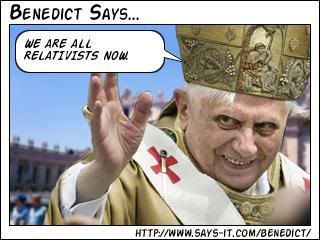It's not easy being atheist, but building strawmen is dead simple.
Pastor Steve at Millersville Bible Church thinks he's figured out what's been eating us atheists:
An atheist assigns himself to life without ultimate purpose. Yes, atheists enjoy many smaller meanings of life-- like friendship and love, pleasure and sorrow, Mozart and Plato. But to be consistent with his atheism, he cannot allow for ultimate meaning. Yet, if the atheist is honest, he will admit to feeling that there is something more to existence -something bigger.The theist is in precisely the same boat--unless he can demonstrate that this "ultimate purpose" of which he speaks actually exists. (He can't.) "Feeling" that there is something more to existence is not evidence that there is more to existence. Nor is it evidence that others share necessary share this "feeling."
The atheist must also suppress the demands of logic. He is like the man who finds an encyclopedia lying in the woods and refuses to believe it is the product of intelligent design. Everything about the book suggests intelligent cause. But, if he accepted such a possibility, he might be forced to conclude that living creatures composed of millions of DNA-controlled cells (each cell containing the amount of information in an encyclopedia) have an intelligent cause. His controlling bias against God will not allow him to accept this.Here's where the encyclopedia analogy falls flat. (i) Everything about the book suggests intelligent cause only because we already know that encyclopedias are human artefacts. (ii) The only intelligent designers of which we are aware are humans. (iii) It does not follow from the fact that encyclopedias have an intelligent cause, that living creatures have an intelligent cause. That's what we call a nonsequitur--unless the author is suggesting that humans are the intelligent cause of all living creatures.
Yet, ironically, the atheist has to believe in miracles without believing in God. Why? Well, one law that nature seems to obey is this: whatever begins to exist is caused to exist. The atheist knows that the universe began to exist and since the universe is, according to the atheist, all there is, the very existence of the universe seems to be a colossal violation of the laws of nature (i.e., a miracle).Nobody suggests that this universe is "all that there is."
But if (i) everything has a cause, and (ii) God is the cause of the universe, then what caused God? Oh, I get it. Your God is "miraculous," so the logic of causation doesn't apply to you. Belief in Christ gives you the power to move goalposts!
An atheist must also suppress all notions of morality.No, he mustn't. What's scary is the notion that morality depends upon a belief in God--and I urge my readers, should they encounter anyone who propounds such a notion, to run very quickly in the opposite direction. The only thing preventing this person from hacking you to pieces, apparently, is his belief in a deity. We call such a person a psychopath.
In fact, the atheist must conclude that evil is an illusion. For there to be evil, there must also be some real, objective standard of right and wrong.How does this constitute evidence of God's existence? It doesn't. In fact, what's happening here is what Voltaire predicted would happen when he said: "If God doesn't exist, we would have to invent him." God is invented, after the fact, as a guarantor of a pre-existing moral code.
The atheist must also live with the arrogance of his position.Lacking a belief in God because there is no reason to believe in God's existence is not arrogant--it's reasonable. What's arrogant is purporting to have such a total knowledge of the universe that one can confidently assert that God exists.
The atheist must also deny the validity of historical proof. If he accepted the standard rules for testing the truth claims of historical documents, he would be forced to accept the resurrection of Jesus Christ from the dead.Only if the "standard rules" amounted to this: it's in the Bible; therefore it's true. But the Bible is not a historical text; nor did historiography mean the same thing two thousand years ago that it does today.
Finally, the atheist must admit that human beings are not importantly different from other animals.It depends what he means by "importantly different." But human beings are, as a result of evolution, importantly different from other animals. They still belong to the animal kingdom, nevertheless.
The realities of human creativity, love, reason, and moral value seem to indicate that humans are creatures uniquely made in the image of God.How so? (Another nonsequitur.)
Always remember that the atheist's problem with belief in God is not the absence of evidence but the suppression of it.No, the atheist's problem with belief in God is the absence of evidence. The notion that evidence for God's existence exists, but is being supressed, is . . . too idiotic for words.
Via Pharyngula

















|